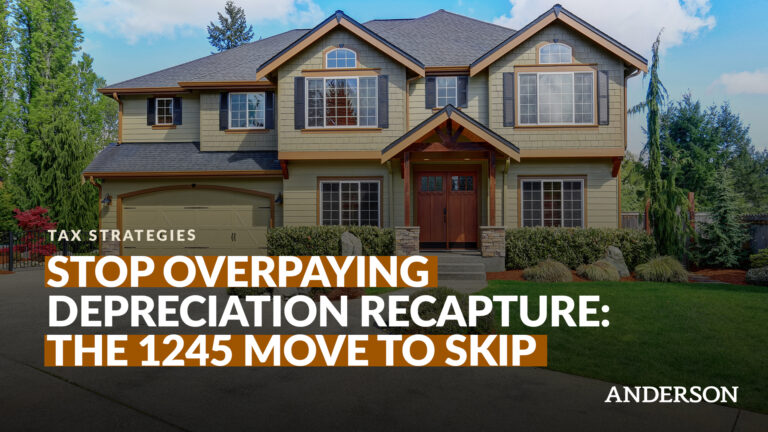

In this episode, Toby Mathis, Esq. speaks with Carl Zoellner, Esq. Managing Attorney at Anderson, to debunk the myth of quitting your job as a means to achieving financial success. They discuss the importance of maintaining a consistent lifestyle and leveraging a good-paying job in order to invest in passive income. The conversation also touches on the potential dangers of following ‘guru’ advice and how to find your passion while focusing on its economic benefits.
Carl and Toby emphasize the significance of channeling your energy into something that can eventually replace your current income while still enjoying the perks of a stable job. They also discuss the concept of tax breaks and how they can play a crucial role in your financial planning journey. Tune in for an insightful conversation on leveraging your employment for long-term financial stability and building a solid financial foundation without quitting your job.
Highlights/Topics:
- Debunking guru advice to quit jobs for a better lifestyle
- Importance of maintaining a consistent, comfortable lifestyle
- Dangers of following unproven investment advice
- Leveraging a good paying job to invest in passive income
- Understanding hype versus logic in investing
- Emphasizing the role of passion in financial success
- Importance of living below one’s means
- Transitioning from active to passive income sources
- Creative financing deals in real estate
- Staying the course with investment fundamentals
- Balancing passion, skill, and economic benefit
- Importance of patience in investing
Resources:
Anderson Business Advisors LinkedIn
Full Episode Transcript:
Toby: Hey, guys. Toby Mathis here with the Anderson Business Advisors Podcast. I have Carl Zoellner on, one of our attorneys. We’re going to explore a little bit into the concept of this idea of what you often times see. These gurus are out there telling you how easy it is to make money, and then you can leave your job, leave your jail behind, take it to the man, or whatever they’re going to be doing. First off, Carl, welcome.
Carl: Thank you. Thank you for having me. I think it’s my first time on the podcast.
Toby: My gosh, you’ve been here for years.
Carl: Longtime listener, first time caller.
Toby: I always say podcasts, but we use these on YouTube. It’s more to educate. The education component today is why you shouldn’t listen to gurus and quit your job. Here we are in 2023. What have you seen in that realm? Do you agree with that sentiment that we should tell the gurus to go stick it?
Carl: Yeah, I do. Mostly because I’m one of the folks they’re advertising to. I’m in my late 30s, I’ve got a little bit of expendable income. I do like to learn about and invest.
The biggest key or tag you see from all these folks are basically, here’s how to quit your job. It’s like, well, what if I don’t want to quit my job? What if I just want to invest in this on the side and grow my nest egg for the future? I don’t buy into the run away from your job. I actually became a lawyer because I thought it would be interesting, and it was something I wouldn’t have to retire from.
Toby: It’s always interesting that maybe they’re going after the people that just hate their job or do something that they are really disgusted with. It does seem to be like an emotional ply, which is, hey, we’re going to show you how to replace it so you can leave, as opposed to, we want to show you how to make passive income so you can choose to work the job that you love. It never seems to be like, hey, do what you really love, or your vocation is your vacation, and you’re really enjoying your life. They never seem to focus on that.
They focus on this pipe dream of, see, you can tell them all the time. Let’s say if you win the lottery. First thing you do as you leave your job. The people that are successful don’t actually leave the stuff that they like doing. They might have some disposable income to do some other things. They’re a volunteer more than they’re an employee, but it doesn’t seem like the successful ones at least make these massive shifts.
Carl: No, I would agree. I would also say too, I thought when I first started doing Infinity Investing, when you guys first rolled it out, you’re like, the way to do it is just put money aside and forget about it. Get it into something and forget about it. I was like, this rich goober telling me to forget about it. How am I going to forget there’s money over there?
Literally, within the last couple of years or so, I’ve been like, oh, yeah, crap, I forgot about I had $10,000 bucks in I bonds over here. It was just like, okay, well, cool. That’s sitting there for a rainy day.
Toby: You’re not really supposed to forget about your money, you’re supposed to know it’s there, Carl. The principle is sound, which is the old hack was open up a brokerage account, have it get funded automatically every month through your paycheck, or just pay it like a bill, where I’m actually gets the money and gets automatically deployed into an index or into the stocks that you care about, then lose your password for 20 years, and then come back and you’ll be very, very successful because you’re not messing with it.
That’s the concept, but there’s a lot of reality in that too like what we’ve seen with the wealthy. They don’t tend to change their lifestyle drastically based off of what revenue happens to be coming in at a particular time. What they do is they pick a consistent lifestyle, it’s something that they like to do. If they don’t like something that they’re doing, they find a way out.
There’s a part of it where I look at the gurus, and I say, okay, I get it. If you’re miserable in your job, you want to do something else, but I don’t think that necessitates the guru. I think that there are these folks out there that are training people how to make money that actually don’t make money. They make their money selling a course or whatnot, and we’ve seen that. You and I have both seen that up close and personal in so many cases, where even if you follow this and you did what they said, you’d still be ending up in disaster. It’s like all these guys that teach.
Carl: Or it’s still a dice roll.
Toby: Yeah. Let’s shift gears a little bit and focus on what’s working. You’re dealing with people on a daily basis, I’m dealing with people on a daily basis. What are you seeing as the successful folks as of right now in 2023? What are they doing? What’s the mindset that they have? Are there any opportunities that you see people following that’s getting them good results?
Carl: One of the things I’ve noticed over the past few years, even leading into Covid, was there were a lot of young professionals with a lot of disposable income. We would go on the road and talk to hundreds of people a week. People would come up to me and go, these guys keep telling me to get rid of my job and do this. I’m a doctor, I’m an attorney. I like what I do. I don’t want to get rid of my job.
What a lot of them started doing, like you said, was basically have an auto draft off of your bank account for $1000 a month to TD Ameritrade or $100 a month to Fundrise, things like this. Eventually, I didn’t even miss it. I look over every so many months, and it’s like, holy crap, there’s $10,000 in my TD Ameritrade account that it wasn’t there when I started this thing, the same thing with Fundrise.
They’re getting decent returns on conservative investments, and that’s okay because they still have the main engine or driver of their income in their careers, professional or otherwise. It’s not only just attorneys, doctors, and things like that, people who are just interested in running business, even their own businesses, without going whole hog into flipping or something like that.
Toby: One thing that I’ve seen is if I was doing this visually, I’d be writing something down on my left side that showed active income, which is, generally speaking, it’s going to be your employment, your side gigs, or your being an independent contractor. You could fill in the blank. It could be Toro, it could be Uber, it could be driving for delivery service, it could be flipping mobile homes, it could be being a real estate agent, it could be being a loan originator, it could be fill in the blank, something that you’re doing as a side job.
I see people going from that edge, that left side, which is your W-2, your side gigs, and moving over into the right side. The right side has stock investments and passive real estate. When I say passive real estate, I mean rental real estate, cash flow real estate. We’re not flipping houses. That would be on the left side of the equation. That would be on the active side of the equation.
What we’re doing is we’re putting things in where the asset does all the work. Is that what you’re seeing to this day, even in this crazy economy, where, oh, the market’s crashing, oh, they’re going to raise interest rates, oh, real estate’s crashing. You hear all this stuff, to me, that’s all on the right side. That’s on the passive side, and they’re screaming so loudly. Are you seeing people just have failures, or are you seeing the wealthy folks still making their money on that right side?
Carl: I’m seeing the wealthy folks still making their money on the right side. What I’m seeing is with the folks who are what I would consider more sophisticated investors, they’re taking little dings here and there along the way, little chips and things like that. The people who are swinging for the fences, on the game stops and things like that, they’re the ones that got absolutely hosed when it turned around on them. But the people who were buying thousands of shares of AT&T are doing just fine.
Toby: Yeah, even though AT&T took a little bit of a bloody nose, and they cut their dividend. They had that little spin off of what Warner, they tossed that up. Everybody was still okay. I’d do the same thing. By the way, I love investing in AT&T. They pay a great dividend. Even with that, I was like, I think I’ll keep it. I think I’ve seen the same thing.
I want to just reiterate something that you said in the very beginning, which is that the engine that makes this thing go might be a W-2 job. The problem with a W-2 job is that you might get sick, you might get fired, you might get laid off. You never know what’s going to happen, right? Business could go get sold, it could go into bankruptcy, or fill in the blank.
One day you’re an employee, and the next day you’re not. If you’re relying on that W-2 income, you might find yourself in a bad spot in the long run. The idea is, it doesn’t mean quit your job. The idea is make sure that you’re living on less than what you bring in, transition it over to the passive side until the passive side is compounded and significant enough to where you don’t need the left side.
I think that’s the misnomer that you see. People immediately think, if I do this, I don’t have to work. Maybe if you replace your profession. If you’re like, hey, I’m going to go flip houses, and you’re really good at it, maybe you might transition out. But I wouldn’t do it until you know, you’re good at it. Until you figure that thing out, that’s like a sport. It looks easy until you get out there and you start playing, and then you realize how difficult it is.
Carl: I don’t know if you’ve seen the same thing. Anybody I’ve talked to who I would consider truly successful, it was never about getting out of work. They just pursued their passion. By pursuing that passion, they knocked it out of the park.
Even gurus. We’re poo-pooing on it a little bit. But the guys who did it right or did it well were the ones that were like, oh, yeah, this is pretty cool, and then got passionate about it, scaled it, and were able to then turn it into more classes in teaching other people how to do it.
Toby: I have seen that. I shouldn’t paint all people with the same brush because there are people that would point at us and say, well, you’re a guru. No, I’m a lawyer. I just happen to see people that are successful and I say, this is what they do. But not all are bad, and not all are the same. A lot of them are really good about something that they’re very passionate about doing.
The trick is understanding where there’s hype and understanding where there’s logic. If you have a good job, and you’re able to live below your means, or even if you have a good job, and you spend more than that job, but you’re able to get a side gig or something else to generate additional wealth that you’re able to put into an investment account, that’s good. You need to have that engine.
Most people skip that part, where you work your ass off and make active money and move it over into the passive side. They think you can go right to owning a whole bunch of real estate. Hey, no money down, you could have 10 houses. Maybe, not really.
I don’t see it very often. I have seen people get no money down properties. There’s usually a carry back and stuff like that. You still have debt on it. It’s not like somebody who said, here’s a free property just because you asked. I haven’t seen that.
What I have seen is people say, hey, I have a good job, and I have good credit. I’m able to lever into some deals that I otherwise couldn’t have. I may have very low to no money down as a result. I’m able to get there, but it required keeping that good paying W-2 job or that consistent income, and then they were able to transition over time. Eventually, the W-2 is not even necessary anymore. Your unknown quantity, they’ve seen you pay back and do all that.
Shift gears again on you just for a second. What have you seen? If there are areas that people are investing in right now since we’re sitting here in 2023 again, and you’ve had pullbacks in the market, you getting out people screaming the sky is falling, what are the big areas that you’re seeing both on the, hey, on the active business side, people able to make some livings within your clientele and then also on the investment side?
Carl: I guess even through all of Covid, I haven’t seen a huge change. For all the puffery we hear on the TV, the jobs that have paid well historically are still paying well. The things that people invest in are still being invested in.
In our Utah office, I actually just saw on the news this morning, they were reporting that this was the best month in real estate since before the pandemic. It’s like, oh, well, so that took way, way, way, way, way.
All the things that have been good in the past are still good. It’s just a matter of, I guess, waiting through the hype. People still need places to live, people still need to work. How could rental property be bad?
The stock market is a little bit less. It’s always been unpredictable overall, but there are still those safer bets as far as ETFs or consistent dividend paying stocks and conservative investments. It’s the same. The stuff that’s been good is continuing to be good.
I would say it is interesting that there’s a couple people who are coming into the investment market at this point. It’s people who are earning money, like you said, on the W-2 who are looking to invest it, and then there are people who’ve already made their money, maybe retired basically from that initial job, and are now looking for a way to spread out and extend that money out. It’s still the same answer.
Toby: How about the people that pulled all their money out in fear? Have you met anybody that just reacted? They saw the news. Oh, my god, the market is going to crash some more. News flash, the market crashes. It comes back, then it crashes, and then it comes back.
Over time, it’s always gone up. Maybe there’s a magic force to push it down, maybe there’s something on a global scale, like we’d have to be after the US dollar. You’d have to have some major things going on.
Carl: When it was all going wild, I was actually trying to find a place where I could invest in Russian oil. When the Russia Ukraine thing went off. I was like, it’s going to come back. It’s not like they’re going to stop using it.
Toby: I don’t think you are allowed to.
Carl: No, it was illegal. I didn’t, but I was looking for it. I was like, if you could do it, it will come back.
Toby: It’s usually that obvious, though. You see that stuff and you’re like, yeah, it’s that obvious.
Carl: It’s illegal, except unless you’re a politician, then you can invest in it.
Toby: What we see now is a lot of people locked into their houses. They get low interest rate mortgages. I think it was, if the mortgage rate of the equivalent of a $600,000 house a couple of years ago or a year ago is essentially a $400,000 house now or $300,000, it’s that extreme. You’ve seen it just completely destroy the value proposition for what people are buying.
Instead of crashing the market, what it’s done is it said, I’m not going to sell my house because I’m not going to get anything close to it at the current interest rates. If I have to swap out my mortgage since I can’t just bring it with me, I can’t get this much value for the dollar, so I’m not. I’m just going to sit on my hands.
Carl: What I’m seeing are some pretty creative financing deals on purchases and sales.
Toby: Are you seeing people actually keep the mortgage on there?
Carl: My neighbor across the street sold his house or was trying to do it as a seller finance deal. I don’t know if he got it.
Toby: I actually bought a house in Vegas during the Great Recession that way. It was somebody who had a modification with Bank of America. It was right around 2%. Even though they had lowered interest rates considerably at the time, it was still quite a bit more, twice as much. It was just simple using a trust and a service provider, able to purchase it that way, and you’re able to get a lot more.
You’re going to see folks that get savvy in those areas, where they realize that it’s not the house, it’s the value. It’s the debt, it’s that mortgage. That low interest mortgage is actually a valuable asset. They’re not going to want to replace it.
The person who’s forced to sell sometimes is because they don’t want to get rid of it. They realize that there’s value there, and they don’t want to have to go and get another one. It’ll be interesting to see what happens in the note market too and non performing notes if you see high interest rates and what’s going to happen there.
Anyway, there’s plenty of opportunity in these types of things. I think that you just named a few. We just talked about a few. We’ll go back in the last section and just talk about moving forward, what you’re seeing, and what you’re hearing for the rest of the year as far as what areas would you be investing in, what areas that do you think are hot for possibly doing side gigs, and based off your experience with working with so many hundreds of successful entrepreneurs and investors.
Carl: I was going to say, I think that’s probably one of the things we underpitched the most, as far as what our platinum clients have access to. We deal with such a volume of people. We get to see these trends and things as they’re coming across, and try to share them as best as we can through all of our social media platforms and different classes we offer.
It has been interesting because the last recession or the Great Recession, I wasn’t with Anderson. I wasn’t really investing heavily at that time. This time, I’m here and I’m seeing it. From the beginning, we’ve said, everybody just take a breath, look at your fundamentals. If you’re good with your fundamentals, then stay firm. It’ll all work out for you. For the people that have, yeah.
To your question earlier, did I see anybody run to cash and then regret it, yeah, a few people. The first thing they say when we get on the call is, I should have kept that Boeing, Tesla, or whatever. I cashed it out, and now I left money on the table. The worse things are leaving a little money on the table, too, but you should have stayed the course. If you were happy with your fundamentals, you should have stuck with them.
Toby: Usually, you sell when it’s all carnage. When it bounces back, you miss it. We see, that’s what I’ve seen over and over again. When you do anything off of a motion, chances are, it’s the opposite of what you should be doing.
It’s funny because you talked about the beginning of the pandemic. I always like to just give people the visual of taking their right hand, stuffing it underneath their right butt cheek, taking the left hand, and stuffing underneath that left butt cheek. Sometimes the best thing you can do, sky has fallen, great, sit on your hands.
You’re not going to do stupid things like, hey, if you’re obviously holding on to a position that has a bleak future because it’s been so overvalued, if you were one of our clients, you probably not in it because you’re following the right principles that you’re not going to be buying those types of companies. But let’s just say that you did. If you have good companies, the best thing you can do is just wait it out and not act emotional.
I think that’s true when you’re dealing with gurus or anybody else. Take a look. If it sounds like a lot of hype, it doesn’t mean that you don’t do it, it doesn’t mean that you throw it out, it just means that you do so measured. Maybe you find something that you love to do that you’re passionate about, that could actually replace your current income. You won’t know until you’ve actually had some degree of success, and you never know right away.
You may think this is really awesome. I love it, great. Channel that energy and learn how to do it really well. If you’re passionate about it, you’re good at it, and it actually makes money, you’ll be successful. You can be as passionate as you want about fixing typewriters. Chances are, you’re not going to make much of a living out of it. You got to find something you’re passionate about, good at, and has an economic benefit.
There’s plenty of things out there that you could find. If you find a guru that’s talking about one of those things, just understand that a lot of those coaches that are there is just there to sell you stuff. They may be well-intentioned, but don’t leave your job. Don’t listen to the guru. Don’t quit your job.
That job is a little engine running everything else, dumping money into your investment, and do like Carl’s talking about and all the successful clients. That is to put it into things and be patient. Don’t forget it, unless you’re like, surprise. It’s like every Christmas. I actually go through my accounts and find the ones I hit.
Carl: I did have a client like that who was like, yeah, every Thanksgiving, I look at all my accounts, and I just write my checks for all the charities I donate to, and then every December we start over again.
Toby: People don’t believe you. They’re like, yeah, actually a lot of the successful folks, it’s in the methodology. They’re not super attentive. They will forget that they have houses sitting in investment accounts. I’ve seen it so many times now.
I used to think it was just, oh, yeah, I forgot about that house. I’m like, sure. Sure like you’re just teasing? No, actually. It wasn’t the first thing in their mind because it’s not that critical to them. They were like, I actually have to do a little bit of an inventory of what I have. Thank God you have accountants tracking it for you sometimes. Otherwise, you might leave it someplace. It’s because they’re doing other things.
This is a great way to conclude. If you love what you’re doing, don’t let somebody talk you out of it, unless it’s illegal. No. But if you love what you’re doing, if you have a good job, and you love your job, there’s nothing better than being a volunteer.
There’s the old adage that money doesn’t buy happiness. I say that money can buy happiness if you give enough of it away. If you’re in a situation, where you’re free to be able to do more for other people and give more away, then you will. You’ll find a lot of happiness in that. At least I keep seeing that with our clients. Carl, anything else?
Carl: No, I think that’s it. I know we like the mind twist stuff, but the mind twist of the whole when you get to a certain income level as well, you actually start buying things for the tax breaks, not for the return on a lot of stuff too, that will not usually trip everybody out as well.
Toby: That tax break is part of the return. It saves me $30,000 that $30,000 I may as well have made. It all gets baked into the pie.
Carl, you’ve been a wonderful guest. I’ll have you on again. We won’t wait many, many years, maybe a decade. We’ll get you back on. I really appreciate your insight.
There’s no replacing talking to folks like you who are actually dealing with the investors and lots of them because you get a good taste. You got your finger right on that pulse. You know what’s going on, so I appreciate you coming on.
Carl: Thank you so much for having me. If you’re already a platinum client, I look forward to chatting with you.












